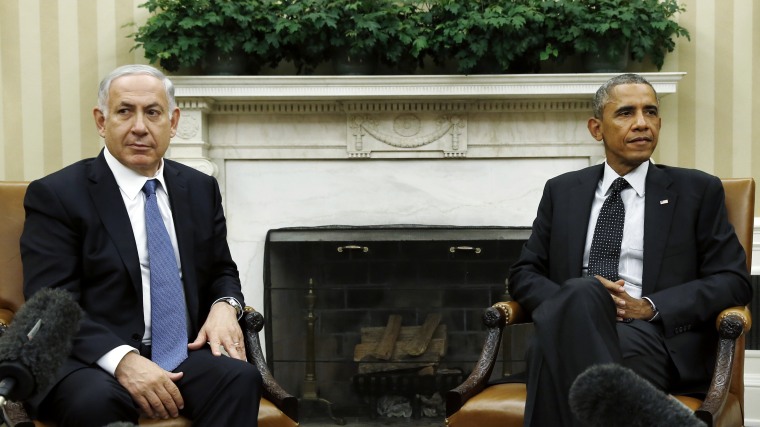When Prime Minister Benjamin Netanyahu
sat down with msnbc's Andrea Mitchell, the Israeli leader said he'd already spoken with Secretary of State John Kerry, and he expected to connect with President Obama soon. Their chat apparently happened
soon after.
President Obama called Israeli Prime Minister Benjamin Netanyahu on Thursday to congratulate him on winning his country's election Tuesday. The president phoned Netanyahu to congratulate "his party's success in winning a plurality of Knesset seats," according to a White House statement.
When is a congratulatory call less than a congratulatory call? When the U.S. leader feels the need to point out that the Israeli leader's party won "a plurality," as opposed to a majority.
Or put another way, Netanyahu's Likud party, which received roughly 24% of the vote, did about as well in Israel this week as President Obama did in 2012 -- in Utah. (Of course, Israeli has a multi-party system, so 24% represents a significant win. When combined with the votes for other far-right parties and Likud offshoots, Netanyahu's agenda and provocative pandering actually enjoyed broad support this week.)
According to the White House's
official readout on the president's call with Netanyahu, Obama also mentioned "the difficult path forward to resolve the Israeli-Palestinian conflict," the White House's "long-standing commitment to a two-state solution," and the president's ongoing focus "on reaching a comprehensive deal with Iran."
Or to put this another way, Obama effectively told the prime minister, "Nice job getting 24% of the vote. If you think your re-election changes anything, think again."
It's against this backdrop that William Saletan
raises an important point.
When you look for a pattern in Netanyahu's behavior -- the settlements, the ethnic demagoguery, the speech to Congress, the retraction of his commitment to an independent Palestine -- no moral principle unites them. What unites them is audacity and calculation. Netanyahu does whatever he thinks he can get away with. That's how he describes the thinking of his adversaries, because that's how he thinks, too. If you listen to Israeli leaders who are trying to influence the behavior of their nation's enemies, the word you'll hear again and again is price. That's why Israel has descended to its current level of disregard for others. It hasn't paid a price.
The question is whether, and how, that might change, and whether Netanyahu's recent antics have been outrageous enough to cause fundamental shifts.
To that end, a White House official
told reporters yesterday that President Obama "told the prime minister that we will need to reassess our options following the prime minister's new positions and comments regarding the two state solution."
Netanyahu, of course, is trying to add
some nuance to his pre-election posturing, arguing yesterday that he has no "new" position, but few find the spin persuasive. It's certainly possible, if not likely, that the prime minister doesn't much care -- he may be under the impression that there will be no consequences for his actions that have frayed U.S./Israeli ties. Indeed, American Republicans are eager to reinforce that impression -- House Speaker John Boehner (R-Ohio) announced last night that he's traveling to Israel "
in about a week."
But American foreign policy remains in the president's hands, and Obama seems reluctant to simply let Netanyahu's misdeeds slide.
